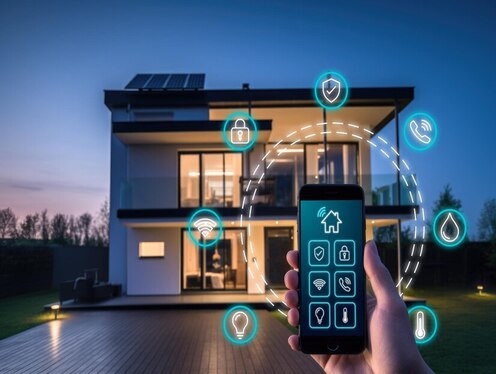In recent years, India has witnessed a rapid evolution in technology, and one of the most prominent advancements has been the emergence of smart homes. The concept of smart homes is revolutionizing the way people interact with their living spaces, offering convenience, efficiency, and enhanced security. As we delve into the realm of smart homes in India, let’s explore the transformative impact, popular technologies, challenges, and the road ahead.
-
The Rise of Smart Homes in India :
India’s urban landscape is experiencing a paradigm shift with the proliferation of smart homes. These technologically integrated dwellings offer residents a seamless experience, empowering them with control over various aspects of their homes, including lighting, security, temperature, entertainment, and more. With the advent of IoT (Internet of Things) devices and robust internet connectivity, smart homes have become more accessible and affordable for Indian consumers.
-
Key Technologies Driving Smart Homes :
- Home Automation: Central to the concept of smart homes, automation systems enable users to control appliances, lighting, HVAC systems, and security devices remotely through smartphones or voice commands. Platforms like Amazon Alexa and Google Assistant have gained popularity for their compatibility with various smart devices.
- Smart Security Systems: Security is a primary concern for homeowners, and smart security systems provide advanced solutions such as CCTV cameras, motion sensors, smart door locks, and video doorbells. These systems offer real-time monitoring and alerts, enhancing home security and peace of mind.
- Energy Management: With rising energy costs and environmental concerns, energy-efficient solutions are gaining traction in Indian smart homes. Smart thermostats, energy monitoring devices, and solar energy systems help homeowners optimize energy usage, reduce utility bills, and minimize their carbon footprint.
- Voice-Activated Assistants: Voice-controlled assistants have transformed the way people interact with their homes. Through voice commands, users can control smart devices, play music, get weather updates, set reminders, and even order groceries, making daily tasks more convenient and efficient.
-
Challenges and Opportunities :
Despite the growing popularity of smart homes in India, several challenges persist, including:
- Affordability: The initial cost of smart home devices and installation may deter some consumers, particularly in a price-sensitive market like India. Manufacturers and service providers need to focus on offering cost-effective solutions to broaden adoption.
- Interoperability: Compatibility issues among different smart devices and platforms can hinder seamless integration and the user experience. Standardization efforts are essential to ensure interoperability and simplify the setup process for users.
- Data Privacy and Security: Smart home devices collect sensitive data about users’ behavior and preferences, raising concerns about data privacy and cyber-security. Manufacturers must prioritize robust security measures to safeguard user information from potential breaches.
- Awareness and Education: Many consumers in India are still unfamiliar with the benefits and functionalities of smart home technology. Increasing awareness through marketing campaigns and educational initiatives can drive adoption and dispel misconceptions.
Despite these challenges, the future of smart homes in India is promising, with ample opportunities for innovation and growth. As technology continues to evolve, smart homes will become more accessible, intelligent, and integrated, transforming the way Indians live and interact with their surroundings.
Conclusion : Smart homes represent the convergence of technology and lifestyle, offering unparalleled comfort, convenience, and security to residents. In India, the adoption of smart home technology is on the rise, driven by advancements in IoT, artificial intelligence, and connectivity infrastructure. While challenges such as affordability and interoperability persist, concerted efforts from stakeholders can address these issues and propel the smart home market forward. As we navigate the future of living spaces, smart homes are poised to redefine the way we experience and interact with our homes in India and beyond.









